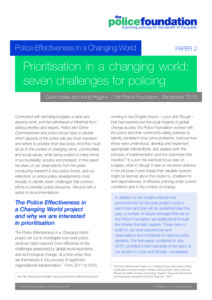Rick Muir the Police Foundation’s director talks about the the importance and the challenges of police prioritisation in a changing world.
Gavin Hales and Andy Higgins of the Police Effectiveness in a Changing World project team discuss why priorisation is important, how aspects of the changing world make it harder to implement and the challenges the police face when they try to decide what is important.
The challenge of prioritisation
Confronted with shrinking budgets, a wide and growing remit, and the withdrawal of Whitehall from setting priorities and targets, Police and Crime Commissioners and police forces have to decide which aspects of the police role are most important and where to prioritise their resources. And they must do so in the context of changing crime, communities and social values, while being subject to many forms of accountability, scrutiny and pressure. We draw on our observations from five years conducting research in two police forces, and our reflections on police policy developments more broadly, to identify seven challenges that confront efforts to prioritise police resources. We end with a series of recommendations.
The Police Effectiveness in a Changing World Project
Between 2011 and 2015, our research team worked closely with the police and their community safety partners in Luton and Slough – two English towns that had experienced the local impact of global change particularly acutely.
Using action research we took a problem-oriented approach by identifying local crime problems, improving the way they were understood and developing interventions to tackle them. Then we assessed the outcomes of these and challenges of implementing them.
Throughout the project we drew on the wider evidence-base on police effectiveness to promote local partnerships, to better deal with the ‘changing world’ and to find sustainable solutions to local crime problems. Most importantly we sought to learn lessons from the process of working with forces on the ground.
